Healthy eating is not a diet – it’s a lifestyle change. It gives you fundamental nutrition knowledge and understanding that there’s no one-size-fits-all approach to diets.
So, how to eat healthy without going on a diet?
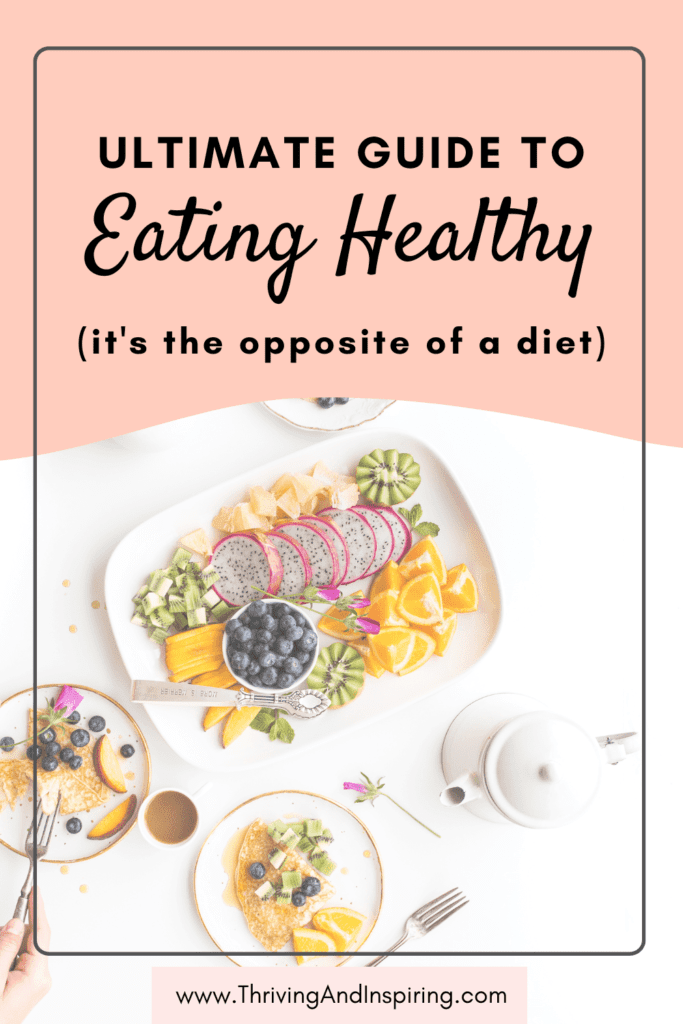
This post may contain affiliate links which means I’ll receive a commission if you purchase through my links, at no extra cost to you. Please read full disclosure for more information.
How to Eat Healthy Without Going on a Diet
Many people confuse healthy eating with diets.
The main difference between the two is that diets give you a set of restrictive rules you need to follow. On the other hand, the purpose of healthy eating is for it to be a lifestyle change.
That’s also the reason why so many diets fail! It’s not that you have weak willpower. Diets fail because the rules are too challenging, restrictive, or time-consuming.
Your needs, goals, and lifestyle are different from someone else’s. That’s why you need a unique approach to building sustainable eating habits that work for you.
If you’re wondering how to eat healthy without going on a diet, here are 7 tips to focus on to start eating healthier without going on a diet (I’ll explain in more detail below):
- Follow the fundamentals of good nutrition
- Maintain good hydration habits
- Eat slowly and mindfully
- Tune into your hunger cues
- Don’t try to be perfect: the goal is to be consistent
- Make healthy options available and convenient
- Embrace a healthy mindset
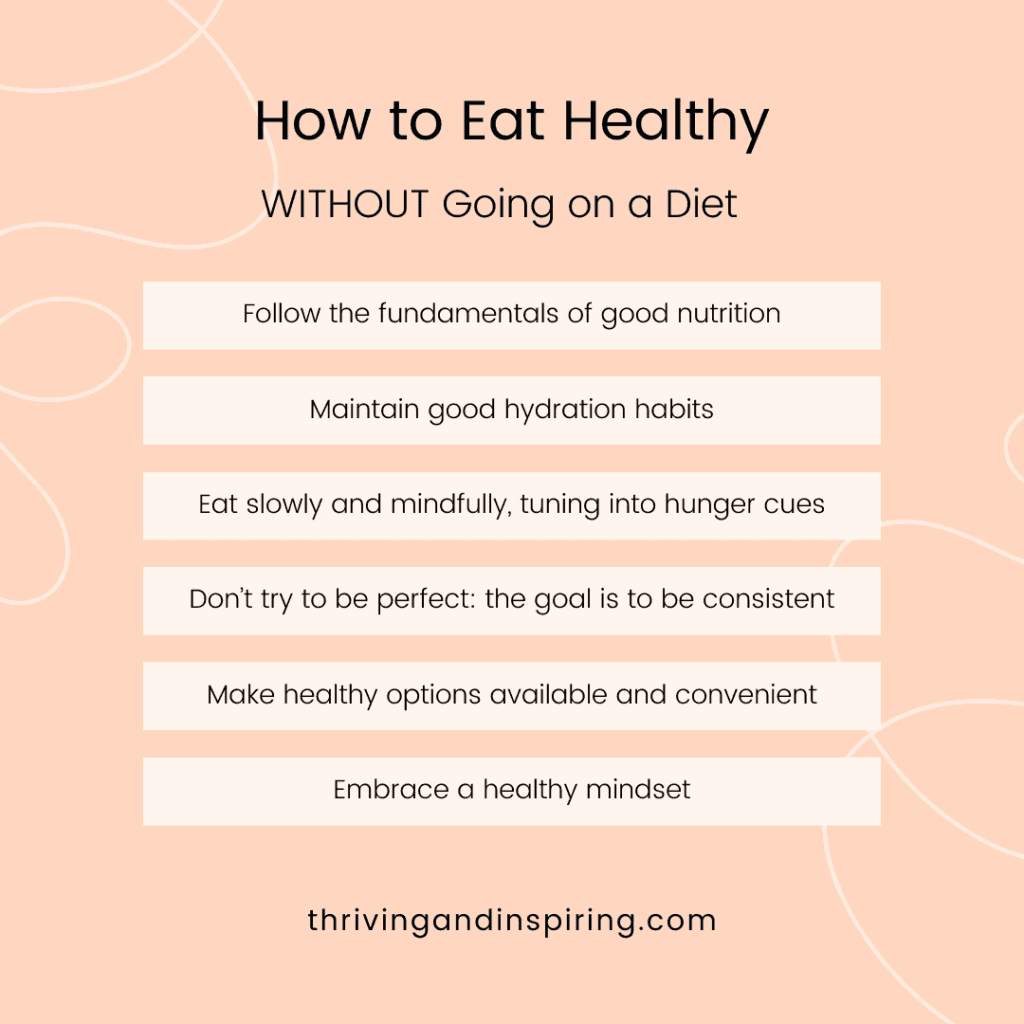
1. Follow the Fundamentals of Good Nutrition
Fundamentals sound a lot like rules. However, it’s completely different. It’s about following the best practices – you can still have your unique approach to them.
You know that to play and win at a game (e.g. healthy eating), you need to understand the rules (fundamentals of good nutrition).
| Related Reading: 6 Tips for Healthy Eating
Good nutrition comes down to those five practices:
Eat More Whole Foods
This is a key point if you’re wondering how to eat healthy without going on a diet!
Whole foods are easy to recognize as they have only one ingredient: chicken, spinach, rice, potatoes, apple, etc.
Processed foods are the reason behind many diseases, allergies, and sensitivities. (Read more about the relationship between processed foods and health.) Maximizing your whole foods intake has a positive impact on your overall well-being.
Eat Protein at Every Meal
Protein is king when it comes to macronutrients. It is the lowest in calories, keeps you satiated, and helps you build muscle.
To eat healthy without going on a diet, eat protein at every meal (even snacks). Start with a protein source when trying to build a meal. This way, you will be sure it’s a top priority.
If you find it hard to eat enough protein, download my free protein cheatsheet. You will understand how to eat more protein and get high-protein meal ideas.
Eat More Fiber-Rich Carbs
Let me start with this: carbohydrates are not your enemy. They are one of the three main macronutrients. Carbs are also your body’s primary source of energy.
Choose fiber-rich carbs when building your meals. Some examples are oats, whole grains, beans, legumes, fruits, and vegetables. They keep you satiated for longer as it takes your body more time to break them down.
The good news about eating healthy without going on a diet is that you don’t have to completely stay away from carbs!
Eat More Healthy Fats
Fats support hormonal balance, micronutrient absorption, and your immune system.
One of the most common deficiencies is the Omega 3 healthy fat. Aim to eat more nuts, nut butters, avocado, cold-pressed, and seed oils, and fatty fish (salmon, tuna).
Healthy snack ideas here!
Eat 4-5 Servings of Colorful Fruits and Vegetables Daily
Fruits and vegetables provide your body with vitamins and minerals (micronutrients). They also have a lot of fiber that supports better digestion.
Aim to eat all the colors from the rainbow to get the most out of the fruits and veggies.
Building a well-balanced diet following the above fundamentals will help you get everything your body needs straight from your food.
Usually, diets tell you what to eat less of x, y, or z. When it comes to healthy eating, you focus on eating more of the good stuff. Don’t restrict.
Adding “good” instead of taking away “bad” is exactly how to eat healthy without going on a diet.
Skye Sauchelli
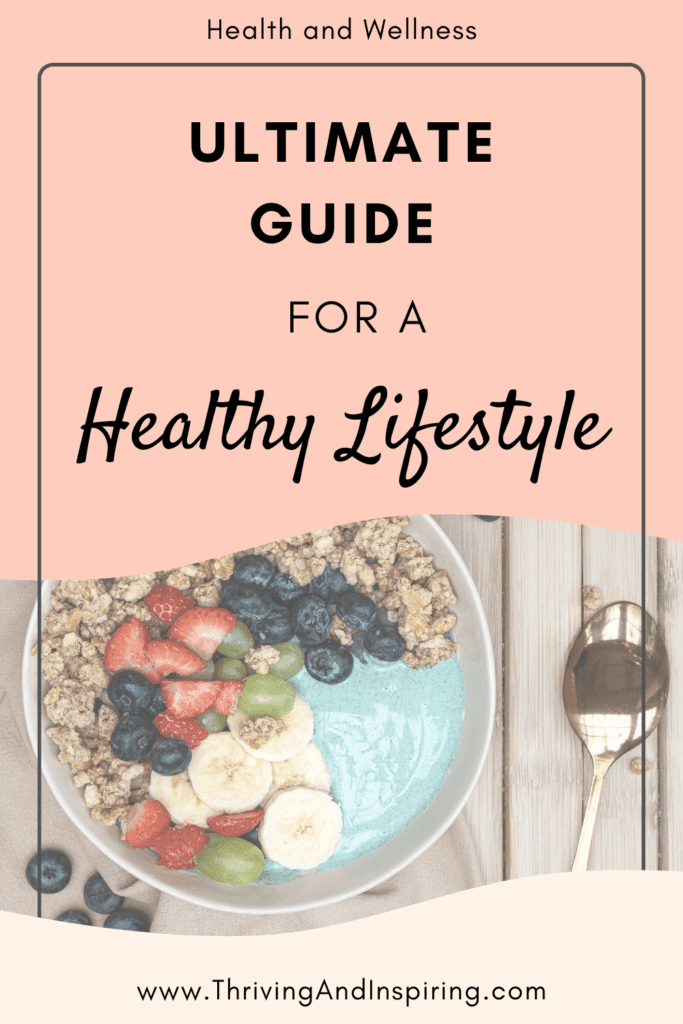
Feel Good Challenge
If you want to FEEL better, take this month-long challenge! It has small daily tasks that will increase your self-care practices and is a wonderful accompaniment to improving your health!
Be sure to check your junk and promotional folders in your email for the free download!
2. Maintain Good Hydration Habits
Drinking enough water is vital when it comes to a healthy lifestyle.
Water helps you regulate your body temperature, absorb vitamins and minerals, flush out waste, support better bowel movement, and more.
For optimal results, drink 32 oz of water for every 45 lbs of your weight.
Another way to think of it is to try to drink half your weight in ounces. If you weigh 150 pounds, cut that number in half (75), and that’s how many ounces of water you should try to drink each day.
If You Struggle to Drink Enough Water:
- Always have a water bottle around you. The more you see it, the more it will remind you to take a sip.
- Skye’s favorite water bottles: Yeti with chug cap and Self-Cleaning Larq that purifies your water
- Add reminders to your phone or smartwatch. You can even track your water
consumption in a journal if you find it helpful.- Or try this water bottle with time markers to encourage you to stay on track with your water consumption.
- If you don’t like plain water, try a flavored one. It can be sparkling or still. Use a water bottle with an infuser and add fruits, veggies, or herbs to it, and see what you like. The most popular additives are lemons, cucumbers, berries, rosemary, and mint.
3. Eat Slowly and Mindfully
When people think about how to eat healthy without going on a diet, they usually associate this with the type of food they “should” or “shouldn’t eat.” But this tip (and the next) is more about HOW you eat.
In the modern world, eating is something we rush to finish to go on with our day. This way, your brain (and therefore, your body) isn’t even aware it’s meal time.
Try to slow down and focus only on your meal whenever you can. Turn off the TV, put down your phone or kindle, and put your attention solely on the food.
As a fast eater, this practice is extremely hard for me, but it’s highly beneficial. To slow down, try to take a deep breath before every bite.
4. Tune into Your Hunger Cues
As a child, you were excellent at recognizing your hunger cues. You only ate when you were hungry. And most probably, stopped once you were full, without overeating.
However, when we become adults, we eat because it’s a certain time, and we’re bored or reminded of food.
And while eating, you usually do something else – watching TV or scrolling through social media. No judgment, the day has only 24 hours, and you have a million things to finish (learn how to balance all the responsibilities of life).
To tune into your hunger cues again, you should start paying more attention while eating. Take note of how certain foods make you feel when you tend to overeat and how you can stop before being stuffed.
Eating slowly and mindfully is the practice to help you best tune into your hunger cues.
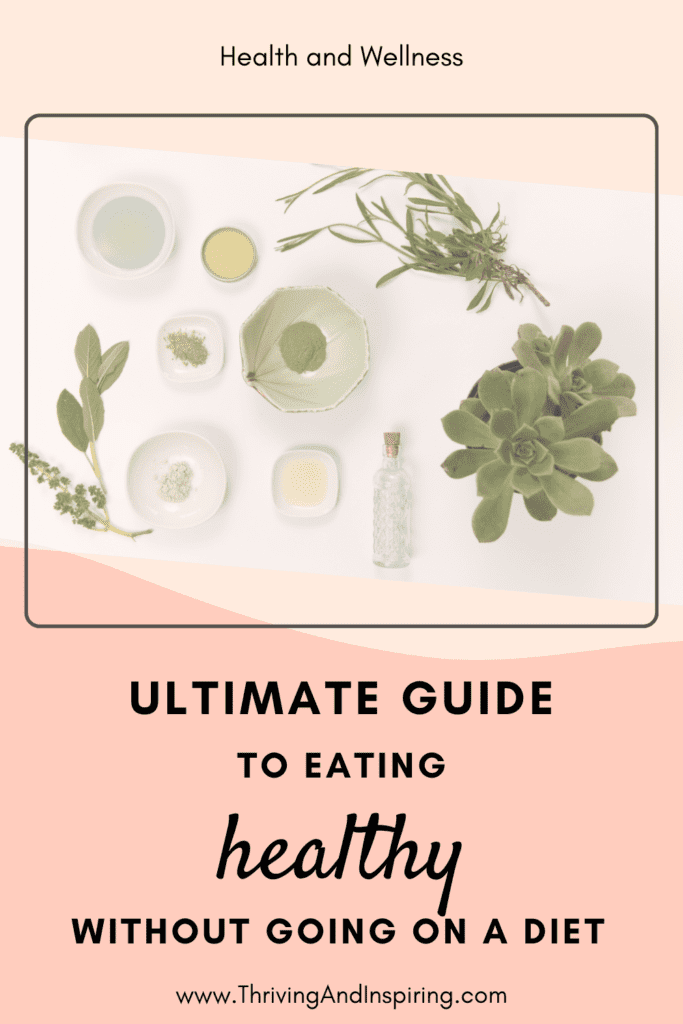
5. Don’t Try to be Perfect: The Goal is to be Consistent
You may think that you need to be 100% perfect to build healthy eating habits. Anything less than that won’t make a difference.
Wrong: it will make all the difference. Tell me, what’s better: one day of eating perfectly or five days of making healthy choices 80% of the time?
Your efforts stack over time. The best thing to do is to focus on one practice at a time.
For example, try to eat protein at every meal. After a month of trial and error, analyze what worked and what didn’t. Once you turn this into a habit, go on to the next practice.
Don’t overwhelm yourself. Remember: You can’t fail at healthy eating. It’s a life-long game.
6. Make Healthy Options Available and Convenient
Sometimes you might have the best intentions and motivation to eat better. However, life happens, and other priorities take over.
But that doesn’t mean you should forget about healthy eating.
Make healthy options available and convenient if you want to embrace healthy eating.
How?
- Plan your meals, schedule time to go grocery shopping, and cook at home.
- Prepare your breakfast the night before.
- Make sure you have a healthy snack in your bag, just in case you get hungry.
- If you know you can’t get healthy food at work, make lunch at home.
The small steps you take today will make your choices easy tomorrow.
7. Embrace a Healthy Mindset
Healthy eating comes with building a healthy mindset. If you’re used to dieting all the time, you have to let go of the toxic and restrictive diet culture.
There are no good or bad foods. You don’t evaluate people based on their food choices or body size.
You are much more than what you eat. You are much more than your weight. You’re a unique human being. You deserve love, no matter whether you eat carbs or not.
Write your beliefs about food and debunk the unhealthy ones. Once you understand that food is just one part of your life, not your whole life, you will free your mind.
Benefits of Healthy Eating
With so many diet types and ways of eating (keto, paleo, vegan, vegetarian, pescatarian, etc.), you might wonder what makes healthy eating superior. Here are the three major benefits of healthy eating:
Eating Healthy Gives You a Better Relationship with Food
Healthy eating does have a set of rules, but it’s about following the fundamentals. It does not stop you from eating meat, dairy, carbs, or even junk food.
This way, you don’t label foods as good or bad. Also, you don’t judge yourself based on your food choices.
Avoiding food restrictions is crucial for building a healthy relationship with food.
Following too many restrictions and rules often leads to food-bingeing and guilt.
Healthy eating helps you understand how different foods make your body feel.
It doesn’t forbid you from eating your favorite foods. You understand how different foods make your body feel, follow the fundamentals of nutrition and know that any food has a place in a well-balanced diet.
Eating healthy without going on a diet is actually so empowering because you can take back your power over food. Food shouldn’t have power over you and how you think and what you think about yourself.
Eating Healthy Gives you More Energy
By prioritizing high-nutrient (healthy) foods, you get more energy. Your body feels powerful, your mind – sharper.
Good nutrition has the power to improve any area of your life.
Prioritize healthy eating if you want to:
- be able to focus
- feel stronger
- improve your sleep
- reduce stress
(More about healthy food and the relationship to increased energy.)
Eating Healthy Allows for Better Mental Health
As we already mentioned, good nutrition impacts many aspects of your life, including your mental health.
High-nutrient foods have the power to improve your mood and reduce stress.
(More about the relationship between healthy eating and mental health.)
Are Diets Bad? Why You Should Stay Away from Diets
Diets are a popular part of the modern world. You will hear at least 2-3 of your colleagues say they are on a diet on a regular day.
There’s nothing wrong with being cautious about what you eat. However, diets tend to overcomplicate nutrition and movement. They make healthy living appear as challenging, restrictive, and time-consuming.
Diets are Not Sustainable
Most of the diets are between 1-3 months. After you finish your diet, you go back to your old habits, therefore, your old results (aka yo-yo dieting).
Diets don’t educate you on how food A makes your body feel or why you should prioritize it. All they tell you is “don’t eat food A.”
Another flaw of diets is that they label foods as good or bad. This process can seriously harm your relationship with food and even end up in an eating disorder.
On the other hand, healthy eating educates you on why you should prioritize protein, high-fiber carbs, or fruits and veggies.
A Lifestyle Change is Better than a Temporary Diet
When you choose healthy eating, you’re choosing a lifestyle change. You don’t change the way you eat for 1-3 months. You understand how different foods make you feel, so you want to prioritize the foods that give you more energy all the time.
Healthy eating doesn’t demonize foods – every food has a place in a well-balanced diet. By understanding how different foods make your body feel, you decide which ones to prioritize and which to eat less – you’re in control.
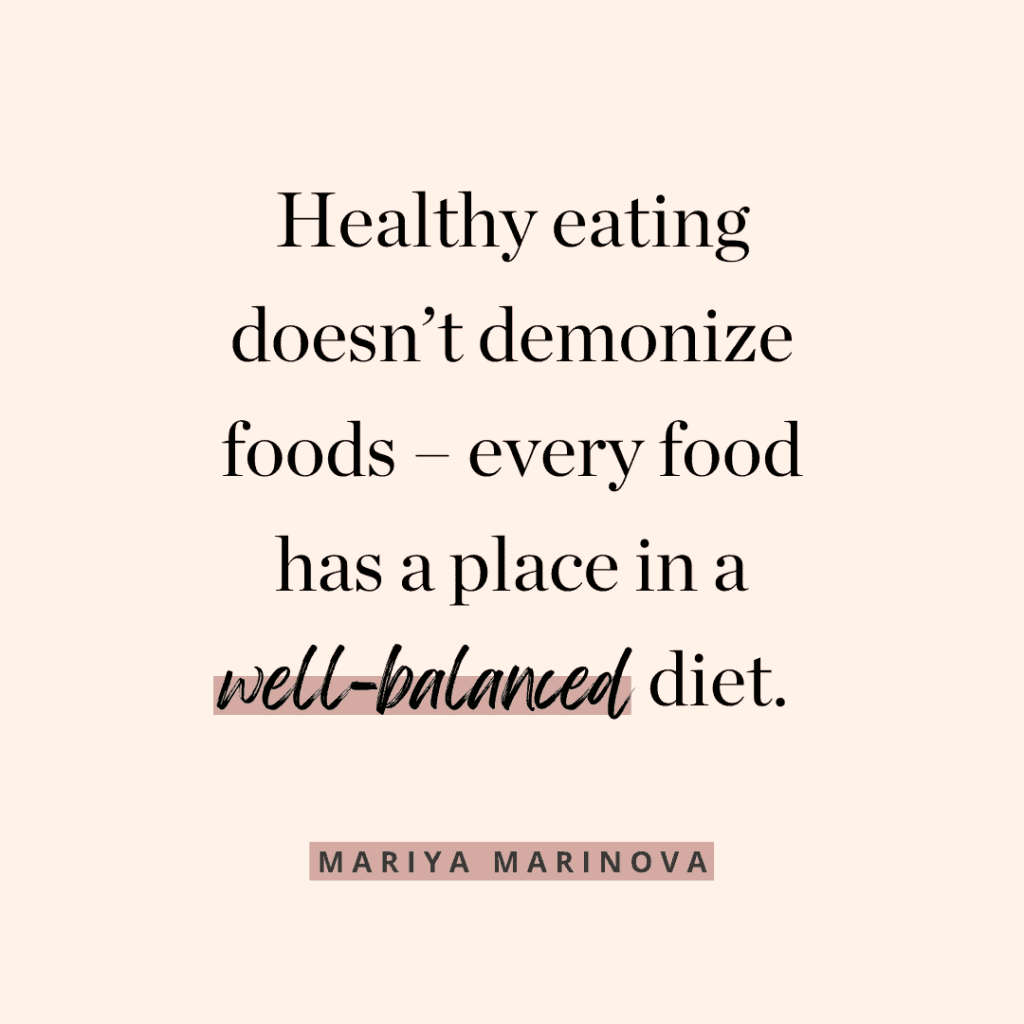
Can You Lose Weight While Eating Healthy?
Absolutely! Not only will you lose weight while eating healthy – you will sustain the results.
Most people don’t follow the fundamentals of nutrition. You will be surprised to see how full you’ll feel after prioritizing whole and high-nutrient foods. Your appetite will regulate, and you won’t feel hungry.
When you’re going for a lifestyle change, you change your habits around food. You’re not prioritizing protein for three months – you’re prioritizing it from now on.
And yes, you’ll have days when you won’t hit your protein intake, and that’s okay. You will try again tomorrow. That’s the magic of healthy eating – you can’t screw this up, and you can’t fail. It’s a life-long game.
Final Thoughts
Eating healthy is way simpler than going on a diet. Healthy eating is not something you stick to for a few months – it’s a lifestyle change.
Healthy eating without going on a diet gives you a basic understanding of nutrition and how different foods make your body feel.
You don’t need to stick to restrictive diets that make you miserable and think about food all the time. By following the fundamentals of nutrition, you have the power to build healthy eating habits you enjoy and that are good for your physical and mental well-being.
About the Author, Mariya Marinova
Mariya, of Thrive While Smiling, is a certified nutrition coach and fitness expert! Her work is all about making it known that healthy eating is for everyone!
Nutrition Coaching
If you feel lost in the nutrition world and need guidance to live your healthiest and happiest life, check out my 1:1 coaching. I can’t wait to help you build a healthy lifestyle you can stick to daily.
Free Resources
You already know that protein is essential for you. But do you manage to eat enough protein every day?
In the protein cheat sheet, you will find 20+ high-protein foods, meal ideas, and tips on how to eat more protein. Healthy eating won’t be so hard.
If you enjoy short and handy nutrition and wellness tips, follow me on Instagram. I share my perspective on how to ditch the diet culture, make healthy eating easy, and build wellness habits.
I hope this article motivated you to keep on going with your wellness journey with more confidence.
Until next time.
-Mariya
Related Reading:
3 Easy, Need-to-Know Changes to Start Eating Healthy
What I Eat in a Day and Why + 6 Tips for Healthy Eating
15 Unique Healthy Snack Ideas that are Guilt-Free & Minimal Prep
The Ultimate Beginners Guide to Exercising- 13 Tips to Get Started
Share this post with someone who could benefit from it!
And follow me on Pinterest for encouraging graphics!

This is such a great article! As a mother to 2 young girls, I worry a lot about the detrimental effects of diet culture. So we work hard to encourage and support a healthy relationship with food. I love that you emphasize consistency over perfection and that eating healthy isn’t about cutting things out of your diet altogether. Thank you for this relevant and thoughtful post!
You are so wise to encourage a healthy relationship with food for your daughters while they’re young. They will reap the benefits of that for years!
I love this healthy approach to eating better. These are the principles I follow as well! I feel eating more vegetables is still a constant struggle for me though! I’m trying to add “juicing” to get more nutrients daily.
Yes, adding in veggies can be tricky! I have found that cauliflower rice is a great way to add extra veg! I throw it in so many random dinners, and you don’t even know it’s there. You can also substitute cauliflower rice instead of ice in a protein shake or smoothie.
I like the approach you took to this article about how to eat healthily without a diet. Actually, I’m not too fond of the word diet because I often correlate it with losing weight when in reality (at least for me), it’s about eating healthy foods and nourishing the body. There are a few key points that you touched base on that I loved too, such as having a good relationship with food. Thanks for sharing!
I agree that our relationship with food is such an important aspect of a healthy lifestyle.
This is a really good article I will reference again as it’s making it all sound so manageable to eat well without deprivation!
Absolutely! Restriction is not the way to go! So glad you found it helpful 🙂
I love this topic and you’ve shared some really great fundamentals of healthy eating here 🙂
Thanks Alison! These fundamentals are key and so often overlooked or forgotten.
I love this healthy approach to eating better. These are the principles I follow as well! I feel eating more vegetables is still a constant struggle for me.This is a really good article . Thanks for sharing.
That’s wonderful that you follow these principles! And yes, the veggie battle is a great one! The key is finding creative ways to add them in.
I like the approach you took to this article about how to eat healthily without a diet. This is what I decided to do last year, and now I’m focusing on adding more protein into my diet which is more challenging then I expected it to be.
I’m so glad you’re incorporating healthy eating instead of a diet! I understand your struggle to add in more protein! Test out different protein powders and try out making protein cookie dough for a filling snack! Mix peanut butter, protein powder, and a liquid like milk or water, plus a handful of chocolate chips.